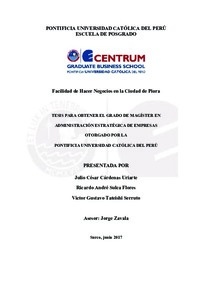| dc.contributor.advisor | Zavala Vinces, Jorge Juan | |
| dc.contributor.author | Cárdenas Uriarte, Julio César | es_ES |
| dc.contributor.author | Sulca Flores, Ricardo André | es_ES |
| dc.contributor.author | Tateishi Serruto, Víctor Gustavo | es_ES |
| dc.date.accessioned | 2017-06-21T23:25:32Z | |
| dc.date.available | 2017-06-21T23:25:32Z | |
| dc.date.created | 2017 | |
| dc.date.issued | 2017-06-21 | |
| dc.identifier.uri | http://hdl.handle.net/20.500.12404/8876 | |
| dc.description.abstract | El objetivo general de la presente tesis es analizar la brecha entre los plazos y costos
reales y la normativa existente sobre los cinco aspectos vinculados con relación a la facilidad
para hacer negocios en la ciudad de Piura, acordes con la metodología del Banco Mundial.
El estudio tiene un propósito descriptivo de enfoque cuantitativo, donde se investiga
acerca de la percepción de empresarios, funcionarios públicos, notarios, abogados y
funcionarios de empresas de distribución eléctrica, sobre los tiempos y costos de los trámites
administrativos relacionados a la formación y puesta en marcha de un negocio. El
instrumento utilizado fue la encuesta en base a un cuestionario estandarizado, según la
metodología del Doing Business del Banco Mundial, con la que se recopiló información de
22 profesionales de la ciudad de Piura.
Los resultados muestran la presencia de brechas en cada uno de los cinco pilares
investigados. Los procesos de apertura de una empresa y permisos de construcción fueron los
pilares con mayores brechas, tanto en costos como en tiempo. El Registro de Propiedad
presenta buenas prácticas replicables en otros procesos a fin. Los procedimientos con
mayores oportunidades de mejora en la apertura de una empresa fueron: elaboración de
Minuta de Constitución, Licencia de Funcionamiento y autorización para anuncios
publicitarios. Con relación a los Permisos de Construcción, la Licencia de Edificaciones y el
Certificado de Factibilidad de servicios de agua y desagüe, estos tuvieron mayores
diferencias.
Se identificaron cuatro estrategias claves para la mejora interna de los procesos: uso
de tecnología; sinergia entre instituciones públicas y privadas; simplificación de procesos; y,
capital humano y cultura organizacional. Estos hallazgos han contribuido a la identificación
de las instituciones y procedimientos claves para enfocar las soluciones. Para ello se ha hecho
uso del diagrama PERT el cual ha permito tener una visión integral de los procedimientos de
los cinco pilares para la generación de negocios en la ciudad de Piura. Adicionalmente, se
crea un precedente para futuras investigaciones que permitan la mejora de la competitividad
de las ciudades de nuestro país | es_ES |
| dc.description.abstract | The general objective of this thesis is to analyze the gap between the actual and
standard costs and terms for five aspects related to the ease of Doing Business in the city of
Piura according to the methodology of the World Bank.
The study has a descriptive purpose of qualitative approach, where it is investigated
about the perception of specialists and entrepreneurs on the times and costs of the
administrative procedures. The instrument used was the survey based on a questionnaire
standardized according to the methodology of the Doing Business of the World Bank, which
collected information from 22 professionals from the city of Piura.
The results show the presence of gaps in each of the five pillars investigated. The
opening processes of a company and Building Permits were the pillars with greater gaps, both
in costs and in time. The Registry of Property presents replicable good practices in other
related processes. The procedures with greater opportunities of improvement in the Opening
of a company were: Preparation of Minutes of constitution, License of operation and
Authorization for commercials. In relation to the Building Permits, the Building License and
the Feasibility Certificate of water and drainage services had greater differences.
Four key strategies were identified for the internal improvement of processes: use of
technology; Synergy between public and private institutions; Simplification of processes;
and, human capital and organizational culture. The findings have contributed to the
identification of key institutions and procedures for focusing solutions. For this purpose, the
PERT diagram has been used, which has allowed an integral view of the procedures of the
five pillars for the generation of business in the city of Piura. Additionally, a precedent is
created for future research that allows the improvement of the competitiveness of the cities of
our country | es_ES |
| dc.language.iso | spa | es_ES |
| dc.publisher | Pontificia Universidad Católica del Perú | es_ES |
| dc.rights | info:eu-repo/semantics/openAccess | es_ES |
| dc.rights.uri | http://creativecommons.org/licenses/by-nc-nd/2.5/pe/ | * |
| dc.subject | Nuevas empresas | es_ES |
| dc.title | Facilidad de hacer negocios en la Ciudad de Piura | es_ES |
| dc.type | info:eu-repo/semantics/masterThesis | es_ES |
| thesis.degree.name | Maestro en Administración Estratégica de Empresas | es_ES |
| thesis.degree.level | Maestría | es_ES |
| thesis.degree.grantor | Pontificia Universidad Católica del Perú. CENTRUM | es_ES |
| thesis.degree.discipline | Administración Estratégica de Empresas | es_ES |
| renati.discipline | 413307 | es_ES |
| renati.level | https://purl.org/pe-repo/renati/level#maestro | es_ES |
| renati.type | https://purl.org/pe-repo/renati/type#tesis | es_ES |
| dc.publisher.country | PE | es_ES |
| dc.subject.ocde | https://purl.org/pe-repo/ocde/ford#5.02.04 | es_ES |






